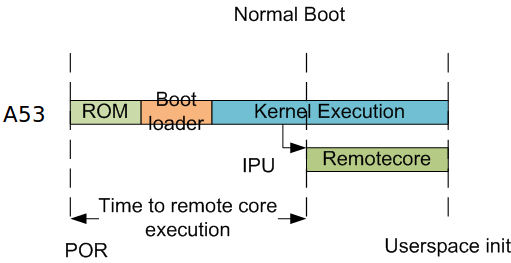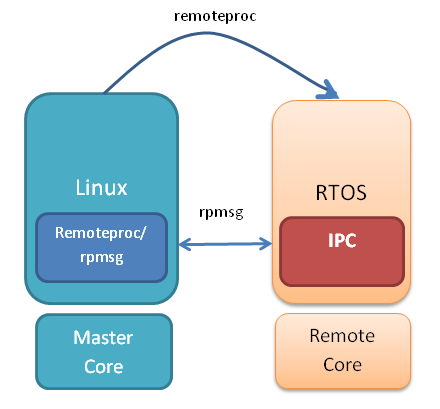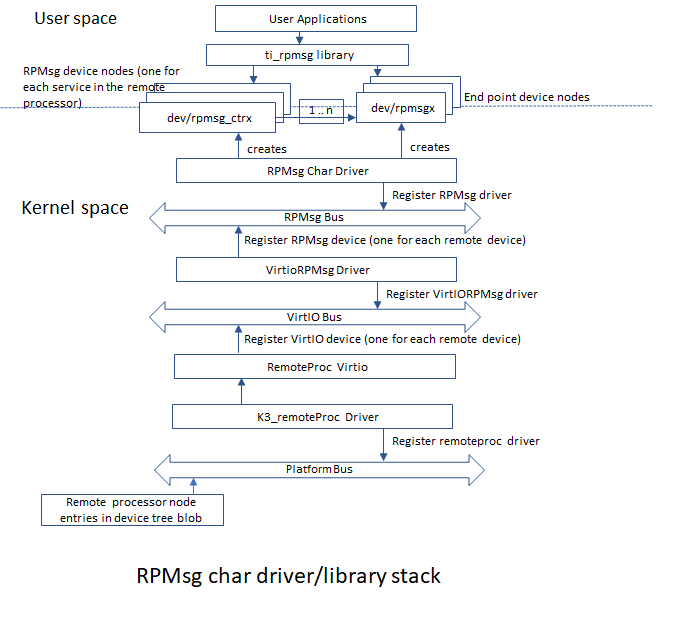4. IPC for AM64x¶
The AM64x device’s main domain consists of Dual-Core Cortex-R5F processor subsystem (R5FSS) in addition to Dual core Cortex-A53 subsystem. The R5FSS can be operated in Dual Core mode or single core mode. Please refer to the AM64x Technical Referece Manual for details.
This article is geared toward AM64x users that are running Linux on the Cortex A53 core. The goal is to help users understand how to establish communication with the R5F cores.
There are many facets to this task: building, loading, debugging, memory sharing, etc. This article intends to take incremental steps toward understanding all of those pieces.
4.1. Software Dependencies to Get Started¶
Prerequisites
- Processor SDK Linux for AM64x |__SDK_DOWNLOAD_URL__|.
- Processor SDK MCU+ for AM64x
Note
Please be sure that you have the same version number for both Processor SDK RTOS and Linux.
Please refer to the MCU+SDK IPC documentation for R5F IPC architecture and builds:
4.2. Typical Boot Flow on AM64x for ARM Linux users¶
AM64x SOC’s have multiple processor cores - Cortex A53, ARM R5F cores. The A53 typically runs a HLOS like Linux/Android and the remote cores (R5Fs) run No-OS or RTOS (FreeRTOS etc). In the normal operation, boot loader(U-Boot/SPL) boots and loads the A53 with the HLOS. The A53 boots the R5 cores.

4.3. Getting Started with IPC Linux Examples¶
The figure below illustrates how remoteproc/rpmsg driver from ARM Linux kernel communicates with IPC driver on slave processor (e.g. R5F) running RTOS.

In order to setup IPC on slave cores, we provide some pre-built examples in SDK package that can be run from ARM Linux.
The remoteproc driver is hard-coded to look for specific files when loading the R5F cores. Here are the files it looks on AM64x device:
+------------------+-----------------+--------------------+----------------------+
| Core Name | RemoteProc Name | Description | Firmware File Name |
+==================+=================+====================+======================+
| R5F0-0 | 78000000.r5f | R5F cluster0-Core0 | am64-main-r5f0_0-fw |
+------------------+-----------------+--------------------+----------------------+
| R5F0-1 | 78200000.r5f | R5F cluster0-Core1 | am64-main-r5f0_1-fw |
+------------------+-----------------+--------------------+----------------------+
| R5F1-0 | 78400000.r5f | R5F cluster1-Core0 | am64-main-r5f1_0-fw |
+------------------+-----------------+--------------------+----------------------+
| R5F1-1 | 78600000.r5f | R5F cluster1-Core1 | am64-main-r5f1_1-fw |
+------------------+-----------------+--------------------+----------------------+
Generally on a target file system the abive files are soft linked to the intended executable FW files.:
root@am64xx-evm:~# ls -l /lib/firmware/
total 31928
-rw-r--r-- 1 1000 1000 2046 Jul 23 2021 LICENCE.iwlwifi_firmware
lrwxrwxrwx 1 1000 1000 72 Jul 23 2021 am64-main-r5f0_0-fw -> /lib/firmware/pdk-ipc/ipc_echo_baremetal_test_mcu1_0_release_strip.xer5f
lrwxrwxrwx 1 1000 1000 72 Jul 23 2021 am64-main-r5f0_1-fw -> /lib/firmware/pdk-ipc/ipc_echo_baremetal_test_mcu1_1_release_strip.xer5f
lrwxrwxrwx 1 1000 1000 72 Jul 23 2021 am64-main-r5f1_0-fw -> /lib/firmware/pdk-ipc/ipc_echo_baremetal_test_mcu2_0_release_strip.xer5f
lrwxrwxrwx 1 1000 1000 72 Jul 23 2021 am64-main-r5f1_1-fw -> /lib/firmware/pdk-ipc/ipc_echo_baremetal_test_mcu2_1_release_strip.xer5f
4.4. Booting Remote Cores from Linux console/User space¶
To reload R5F0 with new executables, please follow below steps:
First identify the remotproc node associated with R5F0. This can be done by:
root@am64xx-evm:~# head /sys/class/remoteproc/remoteproc*/name
==> /sys/class/remoteproc/remoteproc0/name <==
78000000.r5f
==> /sys/class/remoteproc/remoteproc1/name <==
78200000.r5f
==> /sys/class/remoteproc/remoteproc2/name <==
78400000.r5f
==> /sys/class/remoteproc/remoteproc3/name <==
78600000.r5f
root@am64xx-evm:~# echo stop > /sys/class/remoteproc/remoteproc0/state
[25870.043782] remoteproc remoteproc0: stopped remote processor 78000000.r5f
root@am64xx-evm:~# echo start > /sys/class/remoteproc/remoteproc0/state
[25884.945700] remoteproc remoteproc0: powering up 78000000.r5f
[25884.951731] remoteproc remoteproc0: Booting fw image am64-main-r5f0_0-fw, size 86732
[25884.978483] platform 78000000.r5f: booting R5F core using boot addr = 0x0
[25884.988323] remoteproc0#vdev0buffer: assigned reserved memory node r5f-dma-memory@a0000000
[25885.001794] virtio_rpmsg_bus virtio0: rpmsg host is online
[25885.002080] virtio_rpmsg_bus virtio0: creating channel rpmsg_chrdev addr 0xe
[25885.007961] remoteproc0#vdev0buffer: registered virtio0 (type 7)
[25885.022326] remoteproc remoteproc0: remote processor 78000000.r5f is now up
Note
The RemoteProc driver does not support a graceful shutdown of R5 cores in Linux Processor SDK 8.0. For now, it is recommended to reboot the board before loading new binaries into an R5F core.
4.5. DMA memory Carveouts¶
System memory is carved out for each remote processor core for IPC and as external memory to the remote processors code/data section needs. The default memory carveouts (DMA pools) are as below:
+------------------+--------------------+---------+----------------------------+
| Memory Section | Physical Address | Size | Description |
+==================+====================+=========+============================+
| R5F0-0 Pool | 0xa0000000 | 1MB | IPC (Virtio/Vring buffers) |
+------------------+--------------------+---------+----------------------------+
| R5F0-0 Pool | 0xa0100000 | 15MB | R5F externel code/data mem |
+------------------+--------------------+---------+----------------------------+
| R5F0-1 Pool | 0xa1000000 | 1MB | IPC (Virtio/Vring buffers) |
+------------------+--------------------+---------+----------------------------+
| R5F0-1 Pool | 0xa1100000 | 15MB | R5F externel code/data mem |
+------------------+--------------------+---------+----------------------------+
| R5F1-0 Pool | 0xa2000000 | 1MB | IPC (Virtio/Vring buffers) |
+------------------+--------------------+---------+----------------------------+
| R5F1-0 Pool | 0xa2100000 | 15MB | R5F externel code/data mem |
+------------------+--------------------+---------+----------------------------+
| R5F1-1 Pool | 0xa3000000 | 1MB | IPC (Virtio/Vring buffers) |
+------------------+--------------------+---------+----------------------------+
| R5F1-1 Pool | 0xa3100000 | 15MB | R5F externel code/data mem |
+------------------+--------------------+---------+----------------------------+
root@am64xx-evm:~# dmesg | grep 'Reserved'
[ 0.000000] Reserved memory: created DMA memory pool at 0x00000000a0100000, size 15 MiB
[ 0.000000] Reserved memory: created DMA memory pool at 0x00000000a1000000, size 1 MiB
[ 0.000000] Reserved memory: created DMA memory pool at 0x00000000a1100000, size 15 MiB
[ 0.000000] Reserved memory: created DMA memory pool at 0x00000000a2000000, size 1 MiB
[ 0.000000] Reserved memory: created DMA memory pool at 0x00000000a2100000, size 15 MiB
[ 0.000000] Reserved memory: created DMA memory pool at 0x00000000a3000000, size 1 MiB
[ 0.000000] Reserved memory: created DMA memory pool at 0x00000000a3100000, size 15 MiB
By default the first 1MB of each pool is used for the Virtio and Vring buffers used to communicate with the remote processor. The remaining 15MB of the carveout is used for R5 external memory (program code,data, etc).
Note
Please note early boot is not yet supported on AM64x devices. And the resource table entity (describes the system resources needed by the remote processor) needs to be at the beginning of the 15MB remote processor external memory section.
For details on how to adjust the sizes and locations of the R5F Pool carveouts, please see section Changing the R5F Memory Map.
4.6. Changing the R5F Memory Map¶
The DMA memory carveouts wrt the address and size needs to match with the MCU (R5F) external memory section sizes in linker mapfile.
reserved-memory {
#address-cells = <2>;
#size-cells = <2>;
ranges;
main_r5fss0_core0_dma_memory_region: r5f-dma-memory@a0000000 {
compatible = "shared-dma-pool";
reg = <0x00 0xa0000000 0x00 0x100000>;
no-map;
};
main_r5fss0_core0_memory_region: r5f-memory@a0100000 {
compatible = "shared-dma-pool";
reg = <0x00 0xa0100000 0x00 0xf00000>;
no-map;
};
main_r5fss0_core1_dma_memory_region: r5f-dma-memory@a1000000 {
compatible = "shared-dma-pool";
reg = <0x00 0xa1000000 0x00 0x100000>;
no-map;
};
main_r5fss0_core1_memory_region: r5f-memory@a1100000 {
compatible = "shared-dma-pool";
reg = <0x00 0xa1100000 0x00 0xf00000>;
no-map;
};
main_r5fss1_core0_dma_memory_region: r5f-dma-memory@a2000000 {
compatible = "shared-dma-pool";
reg = <0x00 0xa2000000 0x00 0x100000>;
no-map;
};
main_r5fss1_core0_memory_region: r5f-memory@a2100000 {
compatible = "shared-dma-pool";
reg = <0x00 0xa2100000 0x00 0xf00000>;
no-map;
};
main_r5fss1_core1_dma_memory_region: r5f-dma-memory@a3000000 {
compatible = "shared-dma-pool";
reg = <0x00 0xa3000000 0x00 0x100000>;
no-map;
};
main_r5fss1_core1_memory_region: r5f-memory@a3100000 {
compatible = "shared-dma-pool";
reg = <0x00 0xa3100000 0x00 0xf00000>;
no-map;
};
};
Warning
Be careful not to overlap carveouts!
4.7. RPMsg Char Driver¶
The below picture depicts the kernel driver components and the user space device model for using RPMsg Char driver for communicating with the remote processor.

The RPMsg char driver exposes RPMsg endpoints to user-space processes. Multiple user-space applications can use one RPMsg device uniquely by requesting different interactions with the remote service. The RPMsg char driver supports the creation of multiple endpoints for each probed RPMsg char device, enabling the use of the same device for different instances.
Each created endpoint device shows up as a single character device in /dev.
The RPMsg bus sits on top of the VirtIO bus. Each virtio name service announcement message creates a new RPMsg device, which is supposed to bind to a RPMsg driver. RPMsg devices are created dynamically:
The remote processor announces the existence of a remote RPMsg service by sending a name service announcement message containing the name of the service (i.e. name of the device), source and destination addresses. The message is handled by the RPMsg bus, which dynamically creates and registers an RPMsg device which represents the remote service. As soon as a relevant RPMsg driver is registered, it is immediately probed by the bus and the two sides can start exchanging messages.
- The control interface
- The RPMsg char driver provides control interface (in the form of a character device under /dev/rpmsg_ctrlX) allowing user-space to export an endpoint interface for each exposed endpoint. The control interface provides a dedicated ioctl to create an endpoint device.
4.8. ti-rpmsg-char library¶
A thin userspace rpmsg char library is provided abstracting the rpmsg char driver usage from userspace. This library provides an easy means to identify and open rpmsg character devices created by the kernel rpmsg-char driver.
This library support TI K3 family of devices i.e AM65x, AM64x, J721E and J7200 SoCs.
The library provides 4 basic APIs wrapping all the rpmsg char driver calls. Please check documentation in ‘include/ti_rpmsg_char.h’ for details..
- rpmsg_char_init()
- This function checks that the needed kernel drivers (remoteproc. rpmsg, virtio) are installed and accessible from the user space. Further it also checks the SoC device supports the requested remote processor.
- rpmsg_char_exit()
- This function finalizes and performs all the de-initialization and any cleanup on the library. This is the last function that needs to be invoked after all usage is done as part of the application’s cleanup. This only need to be invoked once in an application, there is no reference counting. The function also needs to be invoked in any application’s signal handlers to perform the necessary cleanup of stale rpmsg endpoint devices.
- rpmsg_char_open()
- Function to create and access a rpmsg endpoint device for a given rpmsg device.
- rpmsg_char_close()
- Function to close and delete a previously created local endpoint
All remote proc ids are defined in rproc_id.h
The below table lists the device enumerations as defined in the rpmsg_char_library. The validiaty of the enumerations wrt AM64x is also specified.
+------------------+--------------------+---------+-----------------------------------+
| Enumeration ID | Device Name | Valid | Description |
+==================+====================+=========+===================================+
| R5F_MCU0_0 |N/A | No | R5F SS in MCU domain |
+------------------+--------------------+---------+-----------------------------------+
| R5F_MCU0_1 |N/A | No | R5F SS in MCU domain |
+------------------+--------------------+---------+-----------------------------------+
| R5F_MAIN0_0 | 78000000.r5f | Yes | R5F Cluster0 Core0 in Main Domain |
+------------------+--------------------+---------+-----------------------------------+
| R5F_MAIN0_1 | 78200000.r5f | Yes | R5F Cluster0 Core1 in Main Domain |
+------------------+--------------------+---------+-----------------------------------+
| R5F_MAIN1_0 | 78400000.r5f | Yes | R5F Cluster1 Core0 in Main Domain |
+------------------+--------------------+---------+-----------------------------------+
| R5F_MAIN1_1 | 78600000.r5f | Yes | R5F Cluster1 Core1 in Main Domain |
+------------------+--------------------+---------+-----------------------------------+
| DSP_C66_0 |N/A | No | C66 DSP |
+------------------+--------------------+---------+-----------------------------------+
| DSP_C66_1 |N/A | No | C66 DSP |
+------------------+--------------------+---------+-----------------------------------+
| DSP_C71_0 |N/A | No | C71 DSP |
+------------------+--------------------+---------+-----------------------------------+
Note
The R5F clusters on AM64x can be in either single core or dual core mode. In dual core mode enumerations ‘R5F_MAIN0_1 and R5F_MAIN1_1’ are not valid.
4.9. RPMsg examples:¶
RPMsg user space example
root@am64xx-evm:~# rpmsg_char_simple
_rpmsg_char_find_rproc: SoC doesn't have rproc id 0
Can't create an endpoint device: Success
TEST STATUS: FAILED
root@am64xx-evm:~# rpmsg_char_simple -h
rpmsg_char_simple: invalid option -- 'h'
Usage: rpmsg_char_simple [-r <rproc_id>] [-n <num_msgs>] [-d <rpmsg_dev_name] [-p <remote_endpt]
Defaults: rproc_id: 0 num_msgs: 100 rpmsg_dev_name: NULL remote_endpt: 14
root@am64xx-evm:~# rpmsg_char_simple -r 2 -n 10
Created endpt device rpmsg-char-2-1027, fd = 3 port = 1025
Exchanging 10 messages with rpmsg device ti.ipc4.ping-pong on rproc id 2 ...
Sending message #0: hello there 0!
Receiving message #0: hello there 0!
Sending message #1: hello there 1!
Receiving message #1: hello there 1!
Sending message #2: hello there 2!
Receiving message #2: hello there 2!
Sending message #3: hello there 3!
Receiving message #3: hello there 3!
Sending message #4: hello there 4!
Receiving message #4: hello there 4!
Sending message #5: hello there 5!
Receiving message #5: hello there 5!
Sending message #6: hello there 6!
Receiving message #6: hello there 6!
Sending message #7: hello there 7!
Receiving message #7: hello there 7!
Sending message #8: hello there 8!
Receiving message #8: hello there 8!
Sending message #9: hello there 9!
Receiving message #9: hello there 9!
Communicated 10 messages successfully on rpmsg-char-2-1027
RPMsg kernel space example
root@am64xx-evm:~# modprobe rpmsg_client_sample count=10
[ 192.754123] rpmsg_client_sample virtio0.ti.ipc4.ping-pong.-1.13: new channel: 0x400 -> 0xd!
[ 192.762614] rpmsg_client_sample virtio0.ti.ipc4.ping-pong.-1.13: incoming msg 1 (src: 0xd)
[ 192.767945] rpmsg_client_sample virtio1.ti.ipc4.ping-pong.-1.13: new channel: 0x400 -> 0xd!
[ 192.778102] rpmsg_client_sample virtio0.ti.ipc4.ping-pong.-1.13: incoming msg 2 (src: 0xd)
[ 192.787125] rpmsg_client_sample virtio2.ti.ipc4.ping-pong.-1.13: new channel: 0x400 -> 0xd!
[ 192.793103] rpmsg_client_sample virtio0.ti.ipc4.ping-pong.-1.13: incoming msg 3 (src: 0xd)
[ 192.799752] rpmsg_client_sample virtio3.ti.ipc4.ping-pong.-1.13: new channel: 0x400 -> 0xd!
[ 192.809324] rpmsg_client_sample virtio0.ti.ipc4.ping-pong.-1.13: incoming msg 4 (src: 0xd)
[ 192.823064] rpmsg_client_sample virtio0.ti.ipc4.ping-pong.-1.13: incoming msg 5 (src: 0xd)
[ 192.833132] rpmsg_client_sample virtio0.ti.ipc4.ping-pong.-1.13: incoming msg 6 (src: 0xd)
[ 192.843179] rpmsg_client_sample virtio0.ti.ipc4.ping-pong.-1.13: incoming msg 7 (src: 0xd)
[ 192.853170] rpmsg_client_sample virtio0.ti.ipc4.ping-pong.-1.13: incoming msg 8 (src: 0xd)
[ 192.863228] rpmsg_client_sample virtio0.ti.ipc4.ping-pong.-1.13: incoming msg 9 (src: 0xd)
[ 192.873335] rpmsg_client_sample virtio0.ti.ipc4.ping-pong.-1.13: incoming msg 10 (src: 0xd)
[ 192.883392] rpmsg_client_sample virtio0.ti.ipc4.ping-pong.-1.13: goodbye!
[ 192.891964] rpmsg_client_sample virtio1.ti.ipc4.ping-pong.-1.13: incoming msg 1 (src: 0xd)
[ 192.902022] rpmsg_client_sample virtio1.ti.ipc4.ping-pong.-1.13: incoming msg 2 (src: 0xd)
[ 192.912136] rpmsg_client_sample virtio1.ti.ipc4.ping-pong.-1.13: incoming msg 3 (src: 0xd)
[ 192.922181] rpmsg_client_sample virtio1.ti.ipc4.ping-pong.-1.13: incoming msg 4 (src: 0xd)
[ 192.932270] rpmsg_client_sample virtio1.ti.ipc4.ping-pong.-1.13: incoming msg 5 (src: 0xd)
[ 192.942319] rpmsg_client_sample virtio1.ti.ipc4.ping-pong.-1.13: incoming msg 6 (src: 0xd)
[ 192.952403] rpmsg_client_sample virtio1.ti.ipc4.ping-pong.-1.13: incoming msg 7 (src: 0xd)
[ 192.962433] rpmsg_client_sample virtio1.ti.ipc4.ping-pong.-1.13: incoming msg 8 (src: 0xd)
[ 192.972538] rpmsg_client_sample virtio1.ti.ipc4.ping-pong.-1.13: incoming msg 9 (src: 0xd)
[ 192.982616] rpmsg_client_sample virtio1.ti.ipc4.ping-pong.-1.13: incoming msg 10 (src: 0xd)
[ 192.992836] rpmsg_client_sample virtio1.ti.ipc4.ping-pong.-1.13: goodbye!
[ 193.001472] rpmsg_client_sample virtio2.ti.ipc4.ping-pong.-1.13: incoming msg 1 (src: 0xd)
[ 193.011614] rpmsg_client_sample virtio2.ti.ipc4.ping-pong.-1.13: incoming msg 2 (src: 0xd)
[ 193.020184] rpmsg_client_sample virtio2.ti.ipc4.ping-pong.-1.13: incoming msg 3 (src: 0xd)
[ 193.028628] rpmsg_client_sample virtio2.ti.ipc4.ping-pong.-1.13: incoming msg 4 (src: 0xd)
[ 193.037089] rpmsg_client_sample virtio2.ti.ipc4.ping-pong.-1.13: incoming msg 5 (src: 0xd)
[ 193.045484] rpmsg_client_sample virtio2.ti.ipc4.ping-pong.-1.13: incoming msg 6 (src: 0xd)
[ 193.053874] rpmsg_client_sample virtio2.ti.ipc4.ping-pong.-1.13: incoming msg 7 (src: 0xd)
[ 193.062261] rpmsg_client_sample virtio2.ti.ipc4.ping-pong.-1.13: incoming msg 8 (src: 0xd)
[ 193.070614] rpmsg_client_sample virtio2.ti.ipc4.ping-pong.-1.13: incoming msg 9 (src: 0xd)
[ 193.079000] rpmsg_client_sample virtio2.ti.ipc4.ping-pong.-1.13: incoming msg 10 (src: 0xd)
[ 193.087397] rpmsg_client_sample virtio2.ti.ipc4.ping-pong.-1.13: goodbye!
[ 193.094355] rpmsg_client_sample virtio3.ti.ipc4.ping-pong.-1.13: incoming msg 1 (src: 0xd)
[ 193.102729] rpmsg_client_sample virtio3.ti.ipc4.ping-pong.-1.13: incoming msg 2 (src: 0xd)
[ 193.111134] rpmsg_client_sample virtio3.ti.ipc4.ping-pong.-1.13: incoming msg 3 (src: 0xd)
[ 193.119512] rpmsg_client_sample virtio3.ti.ipc4.ping-pong.-1.13: incoming msg 4 (src: 0xd)
[ 193.127928] rpmsg_client_sample virtio3.ti.ipc4.ping-pong.-1.13: incoming msg 5 (src: 0xd)
[ 193.136292] rpmsg_client_sample virtio3.ti.ipc4.ping-pong.-1.13: incoming msg 6 (src: 0xd)
[ 193.144761] rpmsg_client_sample virtio3.ti.ipc4.ping-pong.-1.13: incoming msg 7 (src: 0xd)
[ 193.153207] rpmsg_client_sample virtio3.ti.ipc4.ping-pong.-1.13: incoming msg 8 (src: 0xd)
[ 193.161691] rpmsg_client_sample virtio3.ti.ipc4.ping-pong.-1.13: incoming msg 9 (src: 0xd)
[ 193.170119] rpmsg_client_sample virtio3.ti.ipc4.ping-pong.-1.13: incoming msg 10 (src: 0xd)
[ 193.178632] rpmsg_client_sample virtio3.ti.ipc4.ping-pong.-1.13: goodbye!
